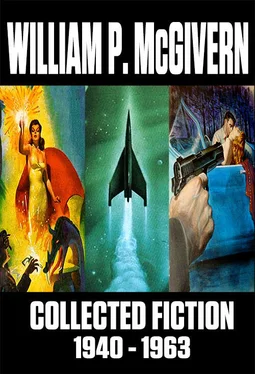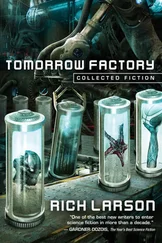Уильям Макгиверн - Collected Fiction - 1940-1963
Здесь есть возможность читать онлайн «Уильям Макгиверн - Collected Fiction - 1940-1963» весь текст электронной книги совершенно бесплатно (целиком полную версию без сокращений). В некоторых случаях можно слушать аудио, скачать через торрент в формате fb2 и присутствует краткое содержание. Год выпуска: 2014, Издательство: Jerry eBooks, Жанр: Ужасы и Мистика, Фантастика и фэнтези, Детектив, Прочие приключения, на английском языке. Описание произведения, (предисловие) а так же отзывы посетителей доступны на портале библиотеки ЛибКат.
- Название:Collected Fiction: 1940-1963
- Автор:
- Издательство:Jerry eBooks
- Жанр:
- Год:2014
- ISBN:нет данных
- Рейтинг книги:3 / 5. Голосов: 1
-
Избранное:Добавить в избранное
- Отзывы:
-
Ваша оценка:
- 60
- 1
- 2
- 3
- 4
- 5
Collected Fiction: 1940-1963: краткое содержание, описание и аннотация
Предлагаем к чтению аннотацию, описание, краткое содержание или предисловие (зависит от того, что написал сам автор книги «Collected Fiction: 1940-1963»). Если вы не нашли необходимую информацию о книге — напишите в комментариях, мы постараемся отыскать её.
Collected Fiction: 1940-1963 — читать онлайн бесплатно полную книгу (весь текст) целиком
Ниже представлен текст книги, разбитый по страницам. Система сохранения места последней прочитанной страницы, позволяет с удобством читать онлайн бесплатно книгу «Collected Fiction: 1940-1963», без необходимости каждый раз заново искать на чём Вы остановились. Поставьте закладку, и сможете в любой момент перейти на страницу, на которой закончили чтение.
Интервал:
Закладка:
Then with a wild prayer of thankfulness pouring incoherently from his lips, he fled hysterically from the scene.
An hour later, Oscar stood dejectedly in a secluded corner, staring moodily at the people streaming by him. For the past hour since he had become invisible, he had roved from one end of the bank to the other, distractedly attempting to figure out what had happened to him.
He sighed heavily, deeply. If only he could regain his visibility, take his place again with normal, visible people!
His bleak musings were disrupted by a sight that made him cringe back against the wall, his heart leaping to his mouth like a startled rabbit.
Two girls were heading toward him, toward the corner in which he had taken refuge. And one of them was Ann Meade, his fiancée until a few short hours ago.
Desperately he peered about for some avenue of escape, but it was too late. The girls had stopped in front of him, so close that he hardly dared breathe for fear of disclosing his nearness. He cowered against the wall, a hot blush staining his invisible features as he realized that the girls were talking about him.
“Oscar is such a worm,” Ann was saying. “I actually feel sorry for him. I couldn’t respect any man who didn’t do things!”
Oscar cringed deeper into the corner, the words biting into his very soul. He could never win Ann back to him now. How could an invisible man “do” things?
It was as he was contemplating his bitter future that he became conscious that something was happening to him. His head began to reel with a peculiar lightness and a strange buzzing noise filled his ears. Puzzled and apprehensive, he peered down at himself. A second later, before his outraged eyes, his body had suddenly become visible again. Baggy brown suit, black shoes, thin hair — they were all back again.
His relief and happiness exploded in one jubilant shriek.
“Wheee,” he cried, “I’m back!”
This ecstatic utterance had an astonishing effect on the two girls.
They wheeled about, their mouths dropping in amazement, their eyes widening incredulously.
“Sorry if I startled you,” Oscar stuttered jubilantly. “But I couldn’t help it. It’s so wonderful to be back again! Ann, don’t you see? I’m back again. You can see me!”
Ann was the first to recover her composure.
“You little snoop!” she blazed, not at all composedly. “Sneaking around, eavesdropping on private conversations! Well, I hope you got an earful.”
“But I wasn’t snooping around,” Oscar cried. “I was here all the time! Ann, you’ve got to believe me. Awful things have been happening to me.”
“Awful things are going to happen to you,” Ann returned grimly, “if you don’t get out of my sight this instant.”
Oscar backed away before her indignant gaze, futile pleading noises sounding in his throat. Sadly he turned and staggered off to his tiny cubby-hole, despair and gloom riding his sagging shoulders.
Reaching the comparative sanctuary of his office, he ducked inside and collapsed in his leather desk chair. His eyes traveled over the neat array of rubber stamps, inkwells and ledgers that adorned the top of his desk. Under the steadying effect of these prosaic objects, reason returned slowly and he began to mull, moodily and morosely, over the events of the morning.
And then suddenly, with the force of a buckshot-stuffed eelskin at the base of the neck, the reason for his incredible transformation occurred to Oscar. Somehow the vanishing cream and his special formula had blended together into a weird compound that had the effect of rendering him invisible.
On top of this deduction came another horrible thought. Would it happen again? Would he go through life snapping on and off like an electric light bulb?
Oscar was not a profane individual but under the stress of the moment, the floodgates of his soul broke, and the torment and exasperation that was dammed there overflowed in one bitter explosion.
“Oh, darn it,” he groaned, “double-darn it all!”
Chapter III
Skulduggery
Work was out of the question. Oscar’s eyes roved about the narrow confines of his office like a trapped rat. Some horrible premonition warned him that the surprises of the day were not over.
“What will happen next?” he sighed. “What will happen next?”
As if awaiting this cue, there came a sharp rap on the door. It was repeated again, loudly, authoritatively.
“Come in,” gasped Oscar.
The door swung open and the ominous bulk of Lester Mercer, efficiency expert, moved into the room. It was followed by the still more ominous bulk of Phineas Q. Botts, president of the bank. This procession was followed by two stern-looking policemen.
Phineas Q. Botts was not in the habit of dropping in casually on his lesser employees to pass the time of day. When he “dropped” in, it was a sure sign something was stirring. Oscar scrambled to his feet, joggling the inkwell on his desk.
“What’s the matter,” he squeaked, “is anything wrong?”
Phineas Q. Botts cleared his throat in a series of harrumphs! that sounded like an engine gathering speed for a long grade.
“For your sake, Doolittle,” he rumbled ominously, “I hope not.”
He inclined his portly figure in the direction of the efficiency expert in a sort of “After you, Alphonse” gesture.
“Mr. Mercer has a few questions to ask you. If—” Botts paused and waggled a finger sternly. “Notice I say ‘if.’ If you answer them to our satisfaction, you have nothing whatever to fear.”
Oscar’s frightened gaze turned to Mercer’s sternly unpleasant features.
“Certainly,” he said nervously, “I’ll be glad to answer any questions I can.”
“First of all, Doolittle,” Mercer began with deceptive calmness, “you took a special, negotiable bond for the amount of twenty-five thousand dollars to the vaults this morning. Is that correct?”
“That’s right,” gulped Oscar, wondering what this was leading to.
“Then you locked the bond in a strong-box,” Mercer continued blandly, “and left the vaults.” He paused, and then added with suspicious politeness, “Is my reconstruction of the scene accurate, Mr. Doolittle?”
Oscar wavered. The conviction was growing in his soul that all was not well. His eyes traveled in a helpless circle to Botts, the policemen and finally back to Mercer.
“That’s right,” he quavered.
Mercer paused, letting the silence weave a cold blanket over the room.
“Then,” his voice was suddenly harsh, “perhaps you will tell us where the bond is now.”
Oscar’s eyes popped open like a hooked bass. His brain struggled to grasp the implication in Mercer’s words.
“You mean,” he gasped, “it’s gone?”
“As if you didn’t know!” Mercer snapped sarcastically. “It was a clever scheme you worked out, Doolittle, but it’s not going to work. No one has entered those vaults since you left.” His voice rose dramatically. “Oscar Doolittle, in the name of the Midland State Bank, I demand that you hand over that bond!”
“But I never took it!” Oscar wailed. “I don’t know anything about it! It’s all a terrible mistake!”
“Then you refuse,” barked Mercer. He wheeled to the policemen, his voice rising to a soaring baritone.
“As officers sworn to uphold the laws and statutes of this commonwealth, I demand that you do your plain duty.”
His arm shot out, pointed accusingly at Oscar’s trembling figure.
“Arrest this man for grand larceny and embezzlement!”
Oscar staggered back, his mind reeling under the accumulated force of these indictments. Through the hysterical fog that swept over him, he could hear Botts speaking.
Читать дальшеИнтервал:
Закладка:
Похожие книги на «Collected Fiction: 1940-1963»
Представляем Вашему вниманию похожие книги на «Collected Fiction: 1940-1963» списком для выбора. Мы отобрали схожую по названию и смыслу литературу в надежде предоставить читателям больше вариантов отыскать новые, интересные, ещё непрочитанные произведения.
Обсуждение, отзывы о книге «Collected Fiction: 1940-1963» и просто собственные мнения читателей. Оставьте ваши комментарии, напишите, что Вы думаете о произведении, его смысле или главных героях. Укажите что конкретно понравилось, а что нет, и почему Вы так считаете.

![Уильям Макгиверн - Завтра опять неизвестность [английский и русский параллельные тексты]](/books/35168/uilyam-makgivern-zavtra-opyat-neizvestnost-angli-thumb.webp)









